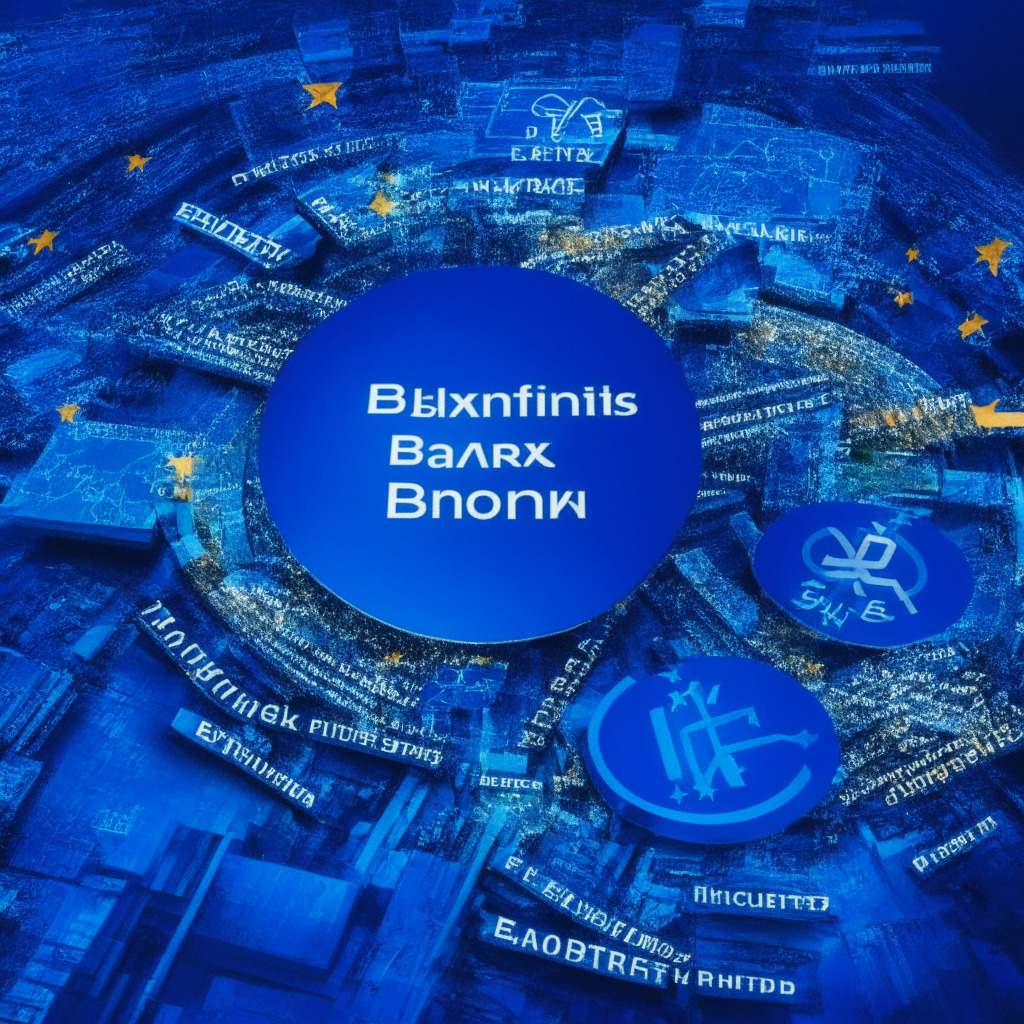Binance, the world’s leading cryptocurrency exchange, revoked its licensing request a month after its application was rejected by Germany’s financial body, BaFin. Despite this, Binance remains committed to securing necessary licensing in Germany, and dealing resiliently with changing global market conditions, including regulation.
Search Results for: markets In Crypto-Assets
Backpedaling or Forward Leaping: Regulatory Uncertainty Puts Crypto Adoption at Crossroads
“Key U.S companies such as Nasdaq and Citigroup reconsider their stance on crypto due to regulatory uncertainty. However, others like Societe Generale and Schroders show a continued interest in crypto. Regulatory environments in the U.S and Europe contrast, with Europe taking a more embracive stance.”
Bitcoin’s Bullish Surge amid ETF Hopes: Europe Leads, while the US Grapples with Regulatory Hurdles
“The Bitcoin market has recently surged, driven by a $25 billion influx, breaking the resistance level at $31,000. Europe leads in the initiation of a Bitcoin ETF, bolstering global crypto enthusiasm. Meanwhile, despite SEC-related challenges, U.S. interest in Bitcoin ETFs increases, potentially boosting investor confidence and Bitcoin’s value.”
South Korea’s Adoption of EU-based Crypto Regulations: Decoding the Global Impact
Upbit, South Korea’s leading crypto exchange, has translated the EU’s cryptocurrency regulation rules, MiCA, into Korean, suggesting a potential global influence of these regulations. South Korea has a history of crypto regulations and this move might indicate a shift towards EU-inspired crypto regulations, which could potentially influence other nations in the future.
Unveiling the Future of Neobanking: Challenges and Opportunities in Crypto Adoption
In a recent interaction with Cryptonews, Nikolay Denisenko, the co-founder and CTO of Brighty app, emphasized the importance of a collaborative approach among crypto companies and regulators to overcome regulatory obstacles and tech limitations in transitioning to neobanking.
Unraveling Deposit Tokens: A Bridge to Crypto for Institutional Investors or Just Marketing Jargon?
“Bernhard Blaha, CEO of The People’s SCE, sheds light on the concept of deposit tokens. Issued by private banks, they are similar to stablecoins but aren’t to be linked with Central Bank Digital Currencies. While some view them as marketing lingo, Blaha believes they could alleviate institutional investment in crypto markets and boost consumer trust.”
Navigating the Crypto Regulatory Maze: Global Framework vs Local Advantages
The crypto industry faces a crossroads due to evolving worldwide regulations, with companies reassessing their positions and seeking crypto-friendly jurisdictions. However, the lack of a global regulatory framework hinders market growth and stability, prompting calls for a coordinated effort to establish global standards and support beneficial innovation.
Binance Reverses Privacy Coin Delisting Decision: Analyzing Compliance and Adaptability
Binance has reversed its plan to delist privacy coins in Europe, revising their classification to comply with EU regulations. Initially, 12 privacy tokens were set to be delisted for users in France, Italy, Spain, and Poland. The retracted decision demonstrates the importance of adapting to regulatory changes and valuing user feedback.
Gary Gensler, SEC, and the Crypto Conundrum: US vs EU Regulations and the Battle Ahead
SEC Chair Gary Gensler faces criticism for his broad approach to cryptocurrencies, causing venture capital investment in the U.S. crypto industry to decline compared to the European Union. The EU’s MiCA legislation acknowledges utility tokens, providing a clear framework for digital assets. New legislation is needed in the U.S. to address the definition of securities and digital asset regulation.
CACEIS Crypto Custody License: Balancing Security & France’s Tightening Regulations
CACEIS Bank, the asset servicing subsidiary of Crédit Agricole and Santander, acquires crypto custody license in France to store users’ private keys and increase institutional clients’ security. With a €2.4 trillion AUM, CACEIS avoids France’s impending stricter regulations while adhering to the EU’s MiCA legislation next year.
Web3 Investments: Hedge Against Tech Disruption or Hype? Exploring the Truth Behind the Trend
Web3 investments serve as a potential hedge against tech industry disruption, despite regulatory challenges and market downturns. Investors increasingly back Web3 and DeFi startups, seeking genuine value in solid projects. Though overcoming reputational and regulatory obstacles remains crucial, the future of blockchain, AI, and crypto-driven industries appears promising.
Navigating Turbulent Regulatory Waters: Binance’s Ongoing Struggle and Crypto Future
The UK Financial Conduct Authority approved Binance Markets Limited’s request to deregister, emphasizing the challenges crypto exchanges face when establishing a regulated presence. Binance’s legal troubles extend to Cyprus and the Netherlands, raising questions about the future of crypto exchanges and the need for adequate regulatory frameworks promoting safety and compliance.
Crypto Regulation Migration: Boon or Bane for the Industry and Investors?
The recent crackdown on crypto regulations in the US has led to alternative locations like the European Union, the United Kingdom, Switzerland, Hong Kong, and the United Arab Emirates adopting more crypto-friendly regulations. However, a Wall Street Journal article cautioned that lenient regulations might only persist until a major scandal triggers stricter rules, impacting investors and the industry’s long-term viability.
Ukraine’s 18% Crypto Tax Proposal: Balancing Regulation and Market Appeal
Ukrainian regulators propose an 18% tax on cryptocurrency gains starting 2024, with plans to introduce a draft law and grant regulatory powers to the National Commission for Securities and Stock Market and the central bank. The proposed tax has sparked mixed reactions in Ukraine’s crypto community, with concerns about discouraging investors and potential user exodus.
French Digital Asset Mediation Surge: Balancing Progress, Disputes, and Market Safety
According to the French stock market regulator AMF’s annual report, digital asset-related mediations and registered digital asset service providers (DASPs) significantly increased in 2022. This growth could indicate increased industry adoption but also raises concerns about potential disputes and the need for stronger oversight.
EU AI Act: Balancing Innovation and Ethics in Artificial Intelligence Regulation
The European Parliament recently passed the EU AI Act, aiming to promote human-centric and trustworthy AI while protecting health, safety, and fundamental rights. The act restricts certain AI services and products, including biometric surveillance and predictive policing, while allowing generative AI models like OpenAI’s ChatGPT and Google’s Bard, provided they are clearly labeled. The challenge lies in balancing innovation and safety in AI development.
Binance’s Cyprus Withdrawal: Strategy or Regulatory Concerns in the Crypto World?
Binance is withdrawing from Cyprus and is under examination for deregistration by the Cyprus Securities and Exchange Commission (CySEC). The move to pull back coincides with the upcoming MiCA regulations enforcement and Binance’s shifting focus towards larger registered EU markets.
Ripple Expands Globally Despite SEC Battle: How Regulatory Clarity Shapes Blockchain Future
Ripple continues to grow its operations in European and Asian markets despite an ongoing legal battle with the US SEC, benefiting from clearer regulations like the EU’s MiCA legislation. This contrast highlights the disparity between the US and other world powers in supporting blockchain and cryptocurrency markets, with MiCA facilitating mainstream adoption and realizing the full utility of cryptocurrencies.
Bitcoin’s Role in Resolving Conflicts and Building Peaceful Monetary Revolution in Europe
The European Bitcoin community is actively addressing conflict situations and social issues within the continent. While some view Bitcoin as an exit strategy, others see it as a voice for change, fostering ideals to tackle challenges like war, migration, and government overreach. Achieving a balance between a new-age, peaceful monetary revolution and promoting decentralized financial tools is crucial for Bitcoin to positively impact Europe.
Blockchain Forever Changes Cross-Border Credential Verification: EU’s Bold Move & Privacy Concerns
The European Commission is collaborating with blockchain provider Protokol on the EBSI Vector project, aiming to simplify cross-border verification of educational and professional credentials. The forthcoming blockchain-based solution promises a secure, decentralized digital infrastructure, incorporating EU initiatives like EUeID. However, maintaining a balance between innovation and regulation is crucial to prevent misuse and protect user privacy.
Binance Privacy Coin Delist: Overreaction or Regulatory Compliance Necessity?
Binance recently delisted privacy coins like Monero and ZCash in several countries, raising concerns. Privacy coins can comply with regulations and provide user adoption benefits. Exchanges should collaborate with regulators to maintain privacy while ensuring legal compliance, instead of banning privacy coins without obligation.
AI vs. Human Governance: Debating Regulatory Efforts and Crypto Restrictions Worldwide
AI experts sign an open statement highlighting the need for mitigating extinction risks from AI, as global regulatory efforts increase. Binance restricts privacy tokens trading in four European countries, while the MiCA cryptocurrency regulatory framework is signed into law.
Gemini’s Global Expansion: UAE Conquest, SEC Challenges, and the Pursuit of Regulation
Gemini crypto exchange, founded by the Winklevoss twins, aims to acquire a crypto license to serve customers in the fast-emerging UAE crypto hub. Meanwhile, the New York-based company establishes its European headquarters in Ireland, working on common sense regulation for the crypto market.
Bitcoin’s Critical $26,600 Support Level Amid Market Shifts and Regulations
Bitcoin’s journey towards $27,000 has prompted focus on a critical support level at $26,600, which will influence its short-term price action. Market shifts, the EU’s MiCA framework, UAE’s AML measures, and Hong Kong’s crypto policy are vital factors impacting the market and Bitcoin’s key support level.
Tether Invests in Georgia’s Crypto Scene: Analyzing the Impact & Challenges of Adoption
Tether plans to expand in the Republic of Georgia by investing in CityPay.io, a leading payment processing company. Georgia is becoming an attractive destination for cryptocurrency companies, thanks to its progressive regulatory framework and initiatives like Binance’s new blockchain hub.
Asian Nations Lead the Charge in Crypto Regulation: Innovations, Trust, and Challenges
Asian nations are increasingly regulating cryptocurrencies, with Japan enforcing stricter Anti-Money Laundering measures, South Korea mandating officials to report crypto holdings, and Hong Kong allowing licensed platforms to serve retail investors. Elsewhere, Beijing fosters Web3 technology innovation, and the International Organization of Securities Commissions pushes for global crypto regulatory frameworks.
Gemini’s Irish Expansion: Navigating European HQ and MiCA Regulation Debates
Gemini’s expansion into Ireland establishes its European HQ, signifying the country’s competitive offering in the international financial services sector. As the upcoming MiCA regulation looms, Gemini continues to navigate regulatory challenges while advocating for common-sense consumer protection and fostering innovation in the crypto industry.
Unregulated Crypto in Europe: ESMA’s Concerns and Firms’ Expansion Into the Market
ESMA reminds companies of crypto assets’ unregulated status in most jurisdictions and expresses concerns over investor protection risks. As MiCA’s adoption approaches, crypto firms like Gemini and Kraken expand European presence, emphasizing the importance of understanding crypto products’ regulatory status for financial safety.
EU Crypto Regulation: Balancing Industry Growth and Financial Stability Risks
European Union regulators are working on new measures to establish rules for the cryptocurrency industry and protect retail investors. The European Systemic Risk Board recommends regular reporting from crypto firms, setting leverage limits, and establishing high collateral requirements for decentralized finance products and stablecoins to maintain financial stability.
European Banks Eye Crypto Adoption: Bitpanda-Coinbase Alliance Pros and Cons
Austrian-based Bitpanda’s partnership with Coinbase enables the integration of Bitpanda Technology Solutions with banks and fintechs, offering crypto products to European customers. This collaboration may fulfill growing demand while raising questions about potential risks and the need for balancing viable digital asset services.
Unmasking Crypto Corruption: Ukraine’s Challenge to Maintain a Thriving Market
Ukraine’s National Anti-corruption Bureau (NABU) is probing the crypto sector to unmask money launderers in collaboration with the United States Embassy and the US State Department. Aiming to scrutinize cryptoassets, the largest training program in NABU’s history will educate participants on combating cryptocurrency-related crimes and ensure that crypto is no longer a means to hide corruption.
Bakkt Eyes International Expansion Amid Evolving Crypto Regulations: Pros and Cons
Bakkt’s Chief Product Officer, Dan O’Prey, reveals plans for retail expansion as the international regulatory landscape for cryptocurrency evolves. Bakkt is exploring retail expansion internationally, focusing on embedded trading, payouts, and rewards. Improved regulations could potentially attract talent and capital, speeding up cryptocurrency integration into mainstream financial markets.































